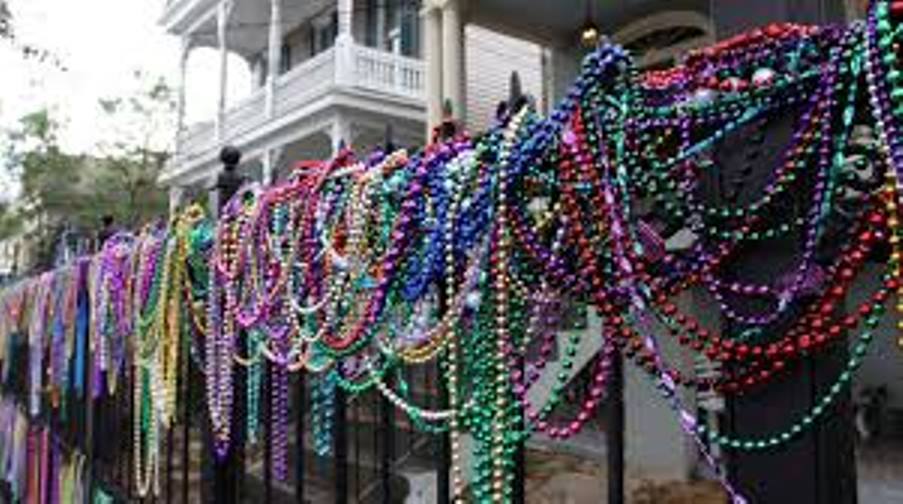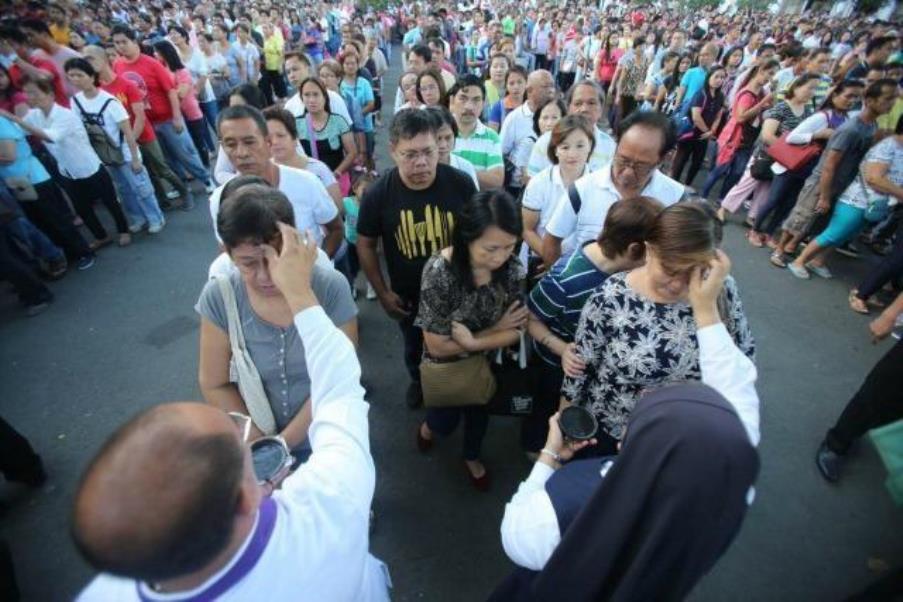|
It took a lovely post by a friend to remind me that Mardi Gras is about to morph into Ash Wednesday.
Bill Lucey, a writer and editor in Cleveland, puts out a thoughtful website about (a) baseball, (b) journalism, and (c) life itself. His post today is about how he should observe Lent this year. His examination of his faith should be read on its own, not in my paraphrasing: https://www.dailynewsgems.com/2019/03/the-meaning-of-giving-up-for-lent.html Lucey's article prompted me to recall Mardi Gras/Ash Wednesday from my own perspective, having been raised (and raised well) as a Roman Catholic. I know my two sisters and their families will be observing Lent. (We took two close relatives to our beloved Mama’s in Corona a few years back –during Lent -- and they had to pass up some of the glories of deli and pastry. Oy. That is faith.) Today’s post by my colleague prompted two memories: 1. As the oldest of five, I was fortunate to walk to church on some weekdays with my Irish-born grandmother, always in black. Sometimes she would take me to a luncheonette on Jamaica Ave., for breakfast after church – but maybe not during Lent. I don’t remember. (Kids, ask questions of your grandparents…and your parents. Get their views, their histories.) 2. My most vivid memory of Mardi Gras/Ash Wednesday is from 1971, when I was a news reporter for the NYT, based in Louisville. I had just covered my first coal-mine disaster, in Hyden, Ky., and was still reporting on it. On Feb. 23, however, I was in central Tennessee, covering a story on an army base. I had no clue about Mardi Gras until I had to wake up before dawn to drive across to a hearing in Eastern Kentucky. Barreling due east on the interstate, I messed with the radio dial (much more fun in the pre-digital age) and found a lively station – WWL, New Orleans, 50,000-watts. This post began as a memory of Lent, a spiritual journey, but somehow it is turning into a tribute to the great clear-channel stations of North America – the ones that would keep you going on cross-country drives. (Grand Ole Opry on Long Island on Saturday nights; one Phillies-Cardinals thriller all the way out to Chicago.) https://www.radiodiscussions.com/showthread.php?617480-50-000-Watt-Stations-on-North-American-Clear-Channel-Frequencies This time, pre-dawn on Feb. 24, 1971, I listened to the overnight DJ on WWL raving about Mardi Gras, which was slowly winding down on the littered and sodden streets of New Orleans. He talked about the beads, the drinks, the costumes, the food, the pretty women, the people leaning off their elegant balconies in the French Quarter, shouting and personifying the slogan: “Laissez les Bon Temps Rouler!” And there I was, in the dark, on I-40, heading to a hearing about poverty and neglect in Appalachia, taking in reports of the last bursts of sensuality in New Orleans. Mardi Gras turning into Ash Wednesday, mile by mile. That was Mardi Gras/Ash Wednesday, 1971. Now, stirred by Bill Lucey in Cleveland, I have to figure some way to honor Lent. Thanks, man.
Randolph
3/5/2019 10:48:50 am
George,
George Vecsey
3/6/2019 09:02:27 am
Randy: I remember the occasional pin-and-handkerchief look. 3/5/2019 04:21:19 pm
You need not be Catholic to appreciate and enjoy both George and Bill’s comments.
George
3/6/2019 09:14:14 am
Alan, you, like so many New Yorkers, got an early feel for other religions and cultures. I must have gone to a dozen bar mitzvahs in Queens (never a bot mitzvah in those days) and of course learned to sing Jewish hymns with our school chorus. I remember a girl describing the spiritual feeling of fasting at Yom Kippur -- she was so respectful and serious about it. New York becomes ever more mixed -- a group of Mennonites from Brooklyn/Queens came to a memorial for a Jewish friend recently, The other night my wife and I met a Muslim bartender from India in our favorite place Diwan -- he has never touched a drop in his life, but had just mixed 100 margueritas at a private party.
Janet Vecsey
3/5/2019 05:15:06 pm
Tomorrow Liz and I will be attending mass together and getting our ashes. Love the part about Nana. Thanks, big brother. Love you!
George
3/6/2019 09:18:13 am
Jane, my love to you and Liz and families.
Joshua Rubin
3/6/2019 09:34:39 pm
Nice post.
Hansen Alexander
3/7/2019 10:29:36 am
George,
bruce
3/7/2019 11:19:07 am
george,
George Vecsey
3/7/2019 05:46:08 pm
Josh: thanks for the memories of Spain. Those processions become quite realistic. House of Dance and Feathers sounds great...next time(!) Hansen, I appreciate your note. Good friend of mine (reporter) hated NOLA -- referred to it as a sewer. I caught the charm, loved taking the St. Charles trolley to the end, just to stare at the Garden District. Ron Swoboda - Ballamer boy -- has taken to NOLA. And Bruce, thanks, my wife interviewed her grandfather about their roots in England -- and much of what he said holds up now that she has Ancestry.com. Rep. Ted Lieu (Calif) was on MSNBC last night with ashes. GV
bruce
3/7/2019 06:09:55 pm
george, 3/7/2019 07:55:34 pm
George I enjoyed your post on Mardi Gras. I recently published a book you might appreciate "City of a Million Dreams: A History of New Orleans at Year 300" (UNC Press). Best always Jason
Gene Palumbo
3/8/2019 10:30:58 am
bruce,
bruce
3/8/2019 11:02:04 am
gene,
bruce
3/8/2019 10:44:51 am
gene,
Gene Palumbo
3/8/2019 08:32:23 pm
For many years the reputation of Camus remained under a cloud in France, even though his novels were widely read, because of his attack on Marxism in his Combat articles and then in his major philosophical work, L'Homme révolté, or The Rebel. The latter was greeted with scorn, especially in Sartre's journal Les temps modernes, and Camus was ridiculed for his "Red Cross mentality," and as merely a "philosopher for classes terminales" [the basic philosophy course taught in the last years of the French lycée]. But the collapse of Marxism, Maoism, and other leftist ideologies, which exercised such a strong grip in France for so many years, has led to a new and much more positive evaluation of Camus's point of view.
Edwin W Martin
3/8/2019 01:40:11 pm
"Thanks for the memories...". Growing up in Rockville Centre, I was in and out of Catholic and Jewish friends homes, maybe even Protestant, but who knew! So, Ash Wednesday and kids with ashes, bar mitzvah, communions were part of everyday. On Facebook I always pass those tests that proclaim, " If you know 10 of these words you are Jewish, or Italian, etc."
George Vecsey
3/8/2019 08:25:33 pm
Ed: WLW in Cincinnati. Kept me listening to Reds games 70-72 with a young guy named Al Michaels. And a great DJ named Jim LaBarbara.
George Vecsey
3/8/2019 08:27:27 pm
Ed: WLW. Young singer named Doris Kappelhof, I believe she went to Hollywood and changed her name. GV
bruce
3/8/2019 08:32:42 pm
george,
Gene Palumbo
3/8/2019 03:50:52 pm
bruce,
bruce
3/8/2019 05:05:59 pm
gene,
Gene Palumbo
3/8/2019 07:16:18 pm
bruce,
bruce
3/8/2019 10:17:46 pm
gene,
bruce
3/8/2019 08:17:13 pm
gene,
George Vecsey
3/8/2019 08:31:49 pm
My wife and I lived on Europe on $5 a Day for a week in Paris in 1966. People would shake their heads and chastise us for Vietnam. Like, didn't we learn? But the city was grand....I think we paid 50 centimes extra for a bath. Can still taste the coffee and croissants. April in Paris., Nice to be young.
Ed Martin
3/9/2019 01:42:01 pm
I can’t resist! Paris in the late 60’s, Peggy and my first visit, but not the last by any means. Woman in window opening to street making delicious crepes with s cigarette dangling from her lips; concierge at tiny hotel Lord Byron, (French writer?) calling out “Neuf” at me, telling me how to pronounce “nine” as in room Nuef; the overwhelming Impressionists at Jue de Paume; Sarge Shriver, the US Ambassador to France admiring Peggy in au courant “mini-skirt,”—“That’s a nifty dress! , Art Buchwald at HT., c’est La vie.
bruce
3/8/2019 08:37:50 pm
gene, Comments are closed.
|
Categories
All
|











